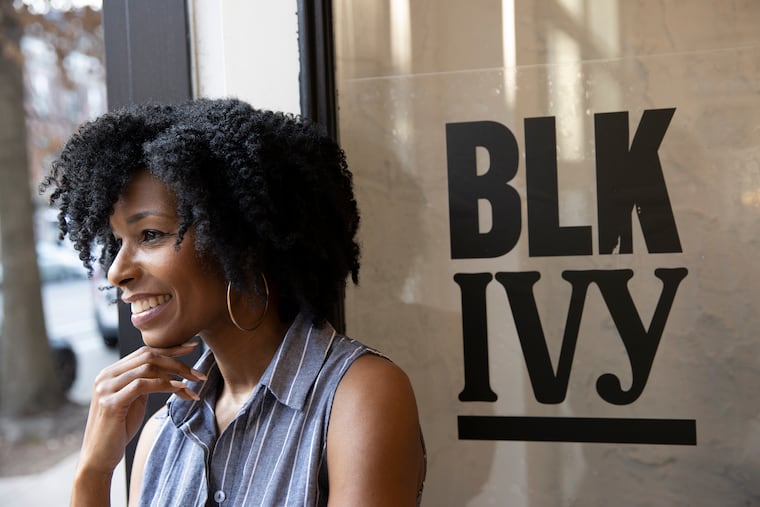At Blk Ivy in West Philadelphia, vintage clothing channels Black power and activism
The store will stock thrift and vintage items associated with the fashion of the civil rights movement from 1954 to 1972.

Floral print shirtwaist dresses, black turtlenecks, and Levi’s are staples in many thrift stores and resale shops.
At Blk Ivy on West Philadelphia’s Lancaster Avenue, such classic American apparel is displayed next to rare Roberta Flack and Bob Dylan albums; a second edition copy of James Baldwin’s Go Tell it on The Mountain; and a 1962 photograph of a young Bernie Sanders protesting segregated housing on University of Chicago’s campus. Here, berets, bell bottoms, corduroys, and cat eyes are surrounded by the same kind of mid-20th century style glassware and furniture one might have found in Medgar Evers’ or Mamie Till’s living rooms, connecting the vintage clothing to the civil rights era.
“Blk Ivy celebrates the era of Black history between 1954 and 1972,” explains Kimberly McGlonn, 43, “between Brown v. Board of Education, when the Supreme Court ruled that racial segregation in public schools was unconstitutional, to 1972 when Shirley Chisholm became the first Black woman to run for president.”
Blk Ivy is where fashion meets activism. As politicians mock antiracist values and are making it a crime to acknowledge systemic racism and sanctioned violence against Black people in American classrooms, Blk Ivy is sharing Black history through fashion. “The long game of continued resistance requires the strategy and energy of the civil rights movement,” McGlonn said. “We can channel this feeling through style.”
Think of Blk Ivy, housed in McGlonn’s former Grant Blvd space, as a shoppable museum. All of the clothing — except for McGlonn’s first vintage piece, a floral 1950s frock — is for sale. The pieces are mixed in with contemporary athleisure like sweatshirts with Blk Ivy printed in block letters. Coffee table books about Black fashion and framed posters that say “I am a woman” are also available for purchase, as well as a stellar collection of vinyl albums like Lena Horne live from 1957 and Isaac Hayes’ 1971 classic Black Moses.
McGlonn’s personal artifacts, however, like her rare books and framed Life magazine covers, a 1959 Remington typewriter, and a 1960s rotary phone, are not for sale. Neither are the smoky photos that include images of Baldwin hanging out with Nina Simone and Bayard Rustin at the 1963 March on Washington. The photos are black and white, so it appears as if the civil rights struggle happened a long time ago, but this is recent American history. Discrimination has only been illegal for 60 years.
The intent, McGlonn said, is for Blk Ivy to be “a space that centers on diverse stories and figures of the civil rights movement. And for us to pay our respects to Black people who struggled for equality, and those who joined as accomplices in the struggle.”
Black Ivy is defined as a moment in American sartorial history when Black artists, including Baldwin, Gordon Parks, and Miles Davis, wore the same buttoned-up Brooks Brothers suits, shearling coats, and spit-shined shoes typical of white Ivy League elitists. These men hoped their debonair dress would earn them respect, social justice, and equality.
McGlonn was introduced to Black Ivy style through a 2016 Netflix documentary about the life of jazz trumpeter Lee Morgan, whose natty suits and wide lapel shirts were a hallmark of the look. Last year she stumbled on Jason Jules’ 2021 coffee table book, Black Ivy: A Revolt In Style.
“I decided to dedicate a space to the style, energy, values, spirit, and endurance of the civil rights movement because that is what got us to where we are today,” McGlonn said. She changed the spelling from “Black” to “Blk” to make her logo look contemporary. And she added women’s clothing to Blk Ivy’s mix — sheaths, pillbox hats, and purses — to put the styles of women like activist Angela Davis and playwright Lorraine Hansberry in conversation with their male counterparts.
She also sees Blk Ivy as a gathering space for activists of all races and genders to listen to live music, network, and strategize. She wants the Blk Ivy brand to be synonymous with defending human rights, voting rights, and civil rights. When people wear Blk Ivy, she says, you will know they stand for justice.
McGlonn, who has a doctorate in school curriculum and design, taught in the Montgomery County public school system for 20 years, including a 10-year stint as an English department chair at Lower Moreland High School. She taught classes in colonialism and marginalization that, she said, influenced her activism.
In 2016, McGlonn took a teaching sabbatical, traveled to Kenya, and was inspired by nonprofits experimenting with solving environmental challenges. After watching Ava Duvernay’s 13th, which examined the prison industrial complex, she decided it was her responsibility to provide opportunities for people to earn living wages. Fashion became her vehicle.
» READ MORE: Beyonce just gifted a grant to this Philly fashion designer who up-cycles used and vintage clothes
She raised $20,000 through bootstrapping and crowd funding and opened Grant Blvd — named after the street where she grew up in Milwaukee — in 2020. Grant Blvd is a manufacturing startup and specialty boutique that offers relaxed women’s suits in bold colors, made from sustainably sourced fabrics. The business won a $10,000 grant sponsored by Beyoncé’s philanthropic foundation in 2021. In April, McGlonn will open a 1,000-square-foot Grant Blvd flagship on Penn’s campus.
With Grant Blvd, McGlonn is using fashion to help advocate for the future, but through Blk Ivy, she says, she’s curating fashion that honors the past.
“Blk Ivy reaffirms and places value on Black history and culture,” McGlonn said. “In this way, fashion becomes a form of advocacy. This is the power I hold as a curator. If this is not the story you want to hear, then you are in the wrong place.”
Blk Ivy is located at 3605 Lancaster Ave.